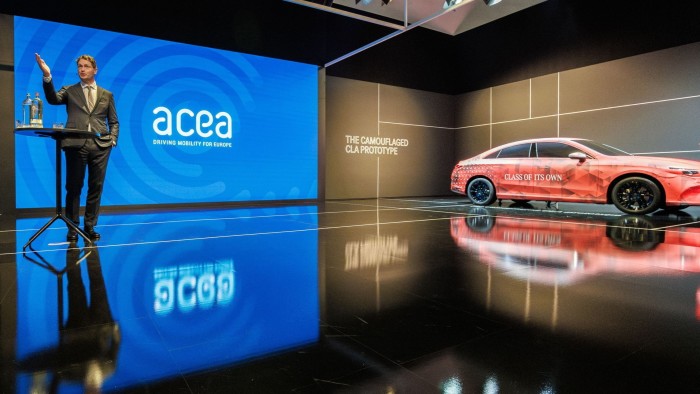Unlock the Editor’s Digest for free
Roula Khalaf, Editor of the FT, selects her favourite stories in this weekly newsletter.
The EU should encourage Chinese carmakers to open more plants in the bloc as part of a deal to drop punitive tariffs on imported Chinese electric vehicles, the boss of Mercedes-Benz has said.
Ola Källenius, who is also president of EU car industry body Acea, said China had asked European carmakers to invest domestically to access its market decades ago, and that approach could form part of a solution to the trade dispute.
“Nobody disagrees about the fact that the level playing field is a legitimate discussion. The question is, what tool do you use?” Källenius told the Financial Times in an interview. “Don’t accelerate protectionism because . . . we have much to lose.”
In October, Brussels imposed tariffs of up to 45 per cent on Chinese EV imports after a big surge in sales, alleging they received unfair subsidies, and opened several anti-dumping and anti-subsidy investigations. Beijing responded with anti-dumping tariffs on brandy and investigations into pork and dairy products.
German carmakers have been the most vocal opponents of protectionist measures as they fear retaliatory moves from Beijing and weakened interest from the country’s consumers at a time when they have already suffered a sharp decline in sales due to the rise of Chinese brands.
They have also struggled to compete against more affordable and advanced Chinese EVs from companies such as BYD.
When German carmakers sought to establish themselves in the emerging Asian economy in the 1980s they agreed to form joint ventures with Chinese partners. Källenius said it was a decision for EU policymakers whether to come up with a reciprocal arrangement.
“When we came to China . . . there was a call upon us by the policymakers: industrialise here if you want to capture the market. From my understanding, European policymakers have said the same, vis-à-vis the Chinese,” he said.
“I think those are legitimate conversations, but that means that you would actually open up markets and create as much as possible a level playing field and then let the best market actor win.”
Brussels is also planning to impose criteria requiring Chinese businesses to have factories in Europe and share technological knowhow. BYD plans to build vehicles in Hungary, while CATL has recently agreed to build a €4.1bn lithium battery factory in Spain with Stellantis.
Kallenius said tariffs would hurt the industry and Brussels should compromise with Beijing on a deal to remove them, adding that China had become an integral part of the global automotive supply chain, including raw materials, advanced chips and components.
“We just want to caution policymakers to say, don’t forget what made us so successful in this complicated world,” he said.
Last week Acea sent a letter to EU leaders urging them not to retaliate against US president-elect Donald Trump’s threatened tariffs.
Mercedes-Benz is one of Germany’s top three carmakers alongside VW and BMW, with significant operations in both China and the US.
Geely and BAIC, which is controlled by the Chinese state, own a fifth of shares in Mercedes-Benz. The carmaker also relies on the Chinese market for about 30 per cent of its global sales.
Read the full article here




